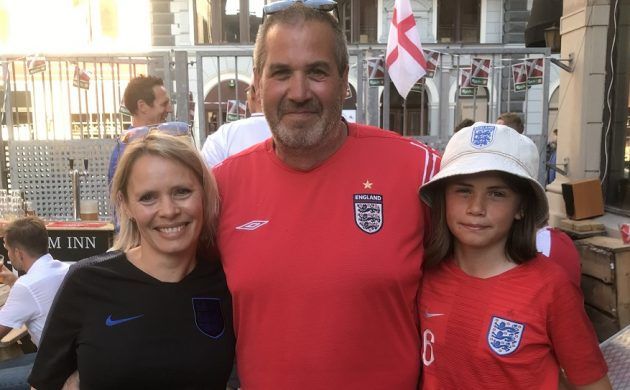If you’re planning to spend half your life down the pub over the next month, but have cunningly decided you’ll top up on gløgg, eggnog and other unholy tipples before setting off, spare a thought for the pubs and bars showing World Cup games as they’re being charged for the right to broadcast the games on TV2.
Landlord: TV2 are blatantly offside
The national broadcaster, which shares the Danish TV rights with DR, has decided to charge bars according to their size: 5,000 kroner should its capacity be under 65 people, 10,000 kroner between 65 and 200, and 200,000 kroner should it be under over 200.
Gus Brown, the landlord of the Copenhagen city centre The Dubliner since it opened in the mid-1990s, has never seen anything like it. He certainly believes there is no legal justification for the charges, but fears contesting it will end up in him drowning in legal fees.
“TV2 are chancing it,” he told CPH POST at Friday lunchtime outside his premises.
“We might have stood a chance of fighting their charge had we clubbed together, but half the bars quickly paid it – for them, it was only 5,000 kroner. Last year I paid nearly 200,000 kroner for the right to show football, and now this. And I’m only able to show about a third of the TV2 games.”
Penalty! Big screen organisers turned down
The pubs and bars are not the only ones feeling the brunt of TV2’s strategy to seek payments to cover part of the cost of acquiring the rights, as many big screen venues have been told they can’t show TV2’s Denmark games – the fixture against France on Saturday and the Round of 16 knockout game, should the Danes make it that far.
One of them was Brøndby Hallen, where the organiser Nikolaj Saabye obtained permission from DR but not TV2 to show Denmark’s games. Ironically enough, he spoke to TV2.
“It is only TV2 that has blocked our plans for a footy festival where people would be able to gather. It’s a real shame, because we had a good agreement with Brøndby Hallen,” he said. “We even intended to donate any surplus to Plan Børnefonden and also Amnesty International, if they had approved the event.”
Saabye was also despondent that TV2 took so long to get back to him about his request, as they were “impossible to enter into a dialogue with”.
TV2’s defence as questionable as Costa Rica’s
Unlike DR, TV2 benefits commercially by showing adverts during its coverage. Traditionally the slots during Denmark’s World Cup games command the highest prices in the industry.
TV2 responded to the criticism with an official statement that did not really clarify anything.
“TV2 has decided that permission cannot be granted for public viewing of TV2’s matches during the FIFA World Cup 2022. Permission cannot be granted, as the event is either considered to have a commercial purpose or to be a form of exploitation of TV2’s rights, which TV2 does not want,” it noted.
TV2 sports manager Frederik Lauesen was unable to say how much money TV2 would lose by allowing fans to watch coverage saturated with television adverts, but he did say that events like Brøndby Hallen’s would impact events endorsed by TV2.
Justification comparable to FIFA’s in 2010
Plans to show a big screen event at Forum, where 8,000 fans would have gathered, were also cancelled after TV2 refused to endorse the event, pointing out that it was too close to its own big screen party at Bella Arena, which sold out rapidly in less than an hour.
However, Lauesen maintains that permission has been given to venues where the expected attendance is less than a thousand, including a lot of schools and voluntary organisations.
“We assess how commercial an event is or whether it competes with some of our own events,” he explained to TV2.
“We are talking about TV rights that are expensive, and TV2 is seeking to protect them, so that we can also buy rights in the future. We have to make our own money. I don’t have a job if I buy expensive rights to give them away.”
Everything in their favour: like France in 1998!
TV2 is the only pay TV broadcaster in Europe that benefits from cheap World Cup rights. Despite its decision to start charging a subscription in 2012, it is still considered a national broadcaster due to its public service remit and being state-owned. It has also remained a European Broadcasting Union member and held onto other privileges.
Launched in 1988, the broadcaster has shared the World Cup rights with DR ever since. The first two tournaments were part of a worldwide collective deal to ensure national broadcasters showed every game – after all, the official tournament sponsors pay a lot and want maximum exposure guaranteed.
However, from 1998 onwards, FIFA figured it could get more out of the national broadcasters by dealing with them country by country. Nevertheless, the price paid is still a huge discount on what broadcasters pay for other football rights, such as the English Premier League. And the audiences are bigger too.
An estimated 90 percent of households have access to TV2.














